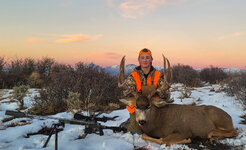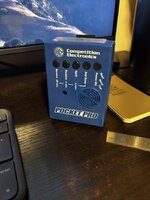Viewing NRL Hunter competitions (or others) through a training tool lens for hunting or real life, versus it being golf with a rifle…..
When designing matches you have a sliding scale of “scenario replication” of whatever someone believes “real life” is, versus shooting skill development and measurement.
Perfect replication of real life in a match is not possible. Real life has time constraints that the shooter does not control- you are on the targets time; as well as the target moving randomly. Matches have to decide how much is given between those two view points.
Using another venue such pistol- you have two main options- static or mostly static competition, and action pistol where it is anything but static. Static pistol matches such as Bullseye- are good for one thing, precision. They fail at nearly every other aspect of shooting. Action pistol matches on the other hand give up a bit in pre precision measurement, but they measure and foster every other skill that used for a handgun. Bullseye shooting is fantastic, but action shooting is far better for skill development in all around use with a pistol.
In action shooting there are really only two venues USPSA and IDPA. USPSA measures raw skill- with no real desire or effort to measure “tactics”. IDPA was started to address the “unrealisticness” of USPSA and force “tactics”.
The “tactical” world repeats ad nauseam that USPSA scenarios are “unrealistic”, and that is true somewhat- USPSA isn’t supposed to replicate scenarios of real life, but to measure raw skill.
USPSA measures and scores all the factors of shooting handguns- drawing, accuracy, recoil control, multiple targets, target to target transitions, reloading, movement, shooting on the move, entering and exiting positions, rapid position changes, varying distances and target sizes, etc, etc; all while being measured to the hundredth of a second. How many points you get per stage (accuracy) and how long it took you to get those points add up to each persons score- that’s total points in a stage divided by your time - this is known as “Hit Factor” scoring. There is no “perfect” score- you can max the points on targets, but someone can always shoot it faster. This means that there is no ceiling to performance as there is no “perfect score” (unlike points and par times).
Equipment ranges from factory Glocks from retention holsters to open guns from open holsters. In either case the skills transfer from one gun to the next- that is a top end Open division shooter, is a top end Production division shooter the first time they pick the production gun up. Same is true in reverse, but to a slightly lessor extent as their is a learning curve to red dots on open pistols.
USPSA is a “free-flow” event. As long as you stay within certain guidelines for safety, you can shoot, move, and engage the targets on each stage as you see fit.
IDPA is relatively similar, except it mandates drawing from concealment, mandates use of cover, mandates when and what type of reloads, target engagement sequences, and when and how to engage targets. It is a time plus scoring in that your raw time is your score, with any missed shots being time added. In order to try to make it “realistic” it becomes far more contrived and unrealistic. Because IDPA tries to force the “scenario” instead of giving people the targets and letting them figure out the best way to shoot it- it artificially limits performance and growth in skill.
Between the two (and every other way) as a raw predictor of skill with a pistol in non-static use- USPSA/IPSC has no equal. Take a mid level or above USPSA shooter and put them on any pistol task that involves dynamic shooting, and they will perform extremely well.
Now let’s compare “rifle” matches. PRS is akin to benchrest, and has almost no real transfer to hunting. Yes it is better than no distance practice, but the equipment and gear is so removed from practicality that it has become too specialized to have much real transfer.
NRL Hunter was ostensibly started to address that. NRL Hunter does not replicate the “real life animal” scenario variability, but instead attempts to replicate the “shooting variability” side of it.
The stages are such that you have a fixed time to find the targets, range them and shoot them. The most movement is from one of four positions on the same target. Almost all shots are from prone, tripod, or triple pull bipod. There is no reloading, and only two shots per target- so no rapid shooting, no target to target transitions, etc, etc. Stages are such that under the par time you must find the targets, range them, and then shoot them.
The very obvious difference right from the start compared to the pistol matches above- is par time versus “time plus” scoring. You have “x” amount of time to shoot a stage, and shooting it faster does not increase your score. This is a massive difference between say USPSA action pistol, 3-gun/multi-gun, and NRL Hunter.
Unless par times are so short that there is no possible way to get all the points in time, the very nature of it means that equipment and focus will be put on other aspects of shooting- this is why PRS has become barricade bench-rest. The long par times as well as the start of NRL Hunter being PRS competitors and not action competitors, is why the “light” gun is 12lbs and they are mostly just lighter versions of PRS rifles. The vast majority of shots are from one of three positions- prone, tripod, triple pull bipod and that, with long par times, has artificially pushed everyone into certain contrived support equipment to do well.
The main issue is that the skill transfer is less than ideal outside of those environments. What you see when good, to really good NRL Hunter competitors (but not action competitors) are hunting, is that as long as the hunting situation and animal presents as they do in matches- they tend to do fine…. Unless they miss or wound on the first shot. Then on average their habituated loading and shooting techniques, the animal moving, any required positions changes, and time being a massive factor- is that their performance drops considerably. When things go wrong, their ability to recover and finish the animal/event is noticeably affected by their lack of ability to “shoot and move” under stress and time. Juxtapose that over to a good, to really good 3-gunner, and the issue you run into with them, is they can shoot before the spotter is ready, and they often shoot animals to the ground.
In seeing a lot of people kill animals, and while holding the other variables inline as much as feasible- when things go wrong action competitors perform better.
Which is logical when you break down what each type of match is doing to, and measuring of- the shooter. It is not that NRL Hunter is “easy” or that it is useless- far from it. It’s that it is measuring less, and what it does measure (and therefor pushes people to improve at) is not necessarily the best things for all-around hunting, and definitely not for recovery on missed or wounded animals.
Take a good NRL Hunter performer and they don’t generally do all that well in other shooting or hunting tasks that are active.
Competition breeds skill- no one is actually highly skilled without competition. Lots of people say they are awesome without ever competing at whatever event they are engaged in; yet when actually measured where they don’t control the event- it never works out that way. One can be “ok” without competing if they take practice seriously and measure their performance; but people aren’t truly skilled compared to those actively competing- the target and the timer are unforgiving mistresses and they don’t care about your feelings.
NRL Hunter and others matches of the same type are better than no competition. Finding the targets is a decent thing on the clock, however, the common matches are not as good as they should be for raw skill development.
Simply switching to a hit factor or time plus scoring systems would dramatically change the landscape of NRL Hunter. So too would it dramatically change/reduce the equipment common to be competitive. Making the max weights match the most common hunting rifles, making unsupported and offhand shots common, and making movement during stage be just enough to cause equipment and rifle management to be a real factor (crawling, climbing, going through or over obstacles, etc.).
If someone doesn’t shoot any matches at all, NRL Hunter is absolutely beneficial. Someone taking their actual hunting rifle, competing and trying to win- is much, much better than just going to a range and banging steel plates.


